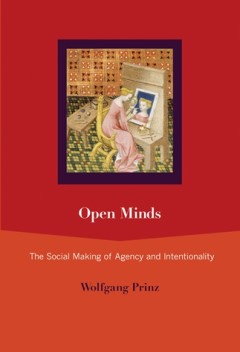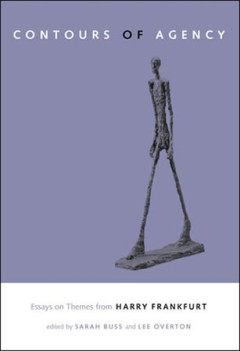Filter by

Open minds :the social making of agency and intentionality
A novel proposal that the cognitive architecture for volition and cognition arises from particular kinds of social interaction and communication.In Open Minds, Wolfgang Prinz offers the novel claim that agency and intentionality are first perceived and understood in others, and that it is only through practices and discourses of social mirroring that individuals come to apply these features to …
- Edition
- -
- ISBN/ISSN
- 9780262301695
- Collation
- 1 online resource (xvi, 341 pages)
- Series Title
- -
- Call Number
- -

The Contours of Agency: Essays on Themes from Harry Frankfurt
"A Bradford book."The original essays in this book address Harry Frankfurt's influential writing on personal identity, love, value, moral responsibility, and the freedom and limits of the human will. Many of Frankfurt's deepest insights come from exploring the self-reflective nature of human agents and the psychic conflicts that self-reflection often produces. His work has informed discussions …
- Edition
- -
- ISBN/ISSN
- 9780262269599
- Collation
- 1 online resource (xx, 361 pages)
- Series Title
- -
- Call Number
- -

How to be human in the digital economy
An argument in favor of finding a place for humans (and humanness) in the future digital economy. In the digital economy, accountants, baristas, and cashiers can be automated out of employment; so can surgeons, airline pilots, and cab drivers. Machines will be able to do these jobs more efficiently, accurately, and inexpensively. But, Nicholas Agar warns in this provocative book, these developm…
- Edition
- -
- ISBN/ISSN
- 9780262349154
- Collation
- 1 online resource (232 pages).
- Series Title
- -
- Call Number
- -

Psychological agency :theory, practice, and culture
A multidisciplinary exploration of agency as a central psychological phenomenon based on the affective, embodied, and relational processing of human experience. Agency is a central psychological phenomenon that must be accounted for in any explanatory framework for human action. According to the diverse group of scholars, researchers, and clinicians who have contributed chapters to this book, p…
- Edition
- -
- ISBN/ISSN
- 9780262273220
- Collation
- 1 online resource (ix, 261 pages)
- Series Title
- -
- Call Number
- -

Beyond Hegel and Nietzsche :philosophy, culture, and agency
Are Hegel and Nietzsche philosophical opposites? Can twentieth-century Continental philosophers be categorized as either Hegelians or Nietzscheans? In this book Elliot Jurist places Hegel and Nietzsche in conversation with each other, reassessing their relationship in a way that affirms its complexity. Jurist examines Hegel's and Nietzsche's claim that philosophy and culture are linked and expl…
- Edition
- -
- ISBN/ISSN
- 0585442681
- Collation
- 1 online resource (xii, 355 pages).
- Series Title
- -
- Call Number
- -

Reasoning about knowledge
Title from title screen.Title from website (viewed Jan. 20, 2006).Reasoning about knowledge--particularly the knowledge of agents who reason about the world and each other's knowledge--was once the exclusive province of philosophers and puzzle solvers. More recently, this type of reasoning has been shown to play a key role in a surprising number of contexts, from understanding conversations to …
- Edition
- -
- ISBN/ISSN
- 9780262256094
- Collation
- 1 online resource (xiii, 517 pages) :illustrations
- Series Title
- -
- Call Number
- -
 Computer Science, Information & General Works
Computer Science, Information & General Works  Philosophy & Psychology
Philosophy & Psychology  Religion
Religion  Social Sciences
Social Sciences  Language
Language  Pure Science
Pure Science  Applied Sciences
Applied Sciences  Art & Recreation
Art & Recreation  Literature
Literature  History & Geography
History & Geography